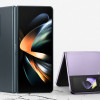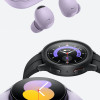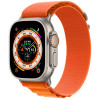Review: Samsung UpStage
Sprint has taken a big leap forward in music with the UpStage. However, despite the numerous improvements in the music player, it still can't compare to what many phones on other carriers offer. The one thing Sprint does have that no one else can offer is 99 cent dual downloads from its music store. Sprint is the first carrier to offer music downloaded over its network for the same price as music downloaded to a PC.
Sprint makes it easy to get music onto the UpStage. If you use a PC, the phone comes with an application that will read all your music from your iTunes, Windows Media Player or other music libraries and make that music available for you to copy to your UpStage. This same application will download songs you've purchased from Sprint to the music library on your PC.
For those without a PC, MP3 or unprotected AAC files can be copied onto the memory card either by connecting the UpStage using the USB cable or using a memory card reader. You can, of course, also get music onto your phone by purchasing it over the air from the Sprint Music Store.
The UpStage comes with a 64 MB microSD card, which is about big enough to hold one album, plus a few pictures. To use the UpStage as a serious music phone, you'll need to replace this with a larger card. Most high-end music phones come with a gig of storage these days - even Sprint's previous music effort the M1 had this much memory. Although a 1 GB microSD can be had fairly reasonably these days, we found 512 MB to be enough to get us started with a decent selection of music with room left to spare for pictures.
Every time you start the music player, it will take some time to build your music library. The first time this takes quite a while. On subsequent launches, it is significantly faster, unless you've changed more than a few tracks.
You can sort your music by artist, album, genre and track name, but no matter how you sort, you will have to scroll through every track to get to your music. For example, you cannot jump quickly through a list of album names and then choose a track on that album. You have to scroll through every track on every album until you get to the one you are looking for.
Once you've gotten this far, you'll need headphones. The Upstage only has Samsung's proprietary connector port, so you'll need to use the included adaptor to plug in your favorite set of cans. The adaptor has a microphone and a call button along with a 3.5mm jack. Sprint did not include any of its own freebie headphones with the adaptor, so you'll need to plug in your own. This setup creates a rather messy bundle of cords which you can skip if you opt to use Bluetooth headphones, an experience we recommend.
Once your music is playing you can use left, center and right on the navigation pad to control your music, or the controls on your Bluetooth headphones. For the first time, you can also leave the music player to do other things. You can compose a text message or surf the web using either the browser or the On Demand application. However when the music player is in the background the music controls are disabled - not just on the phone but even on Bluetooth headphones.
While music is playing - either in the background or with the music player in front - you can receive incoming calls and text messages. You're alerted to texts with a simple sound, but incoming calls announce the caller's name or number in your headphones, so that you don't need to look at the screen.
Should you exit the music player to do anything else, it will lose your place. The next time you relaunch the player it will rebuild the music library and it will not remember where you were at in a track, or even what track you were playing. This is frustrating, especially considering how limited your choices are for background tasks while music is playing. And made worse by the fact that scanning fast forward through a song ranges from difficult for short songs to impossible for longer ones. A bug appears to prevent us from fast-forwarding through any song longer than about 20 minutes. (Which are common if you listen to a lot of podcasts and DJ mixes.)










 Preview: Samsung UpStage
Preview: Samsung UpStage
 Samsung Refines its Foldable Phones
Samsung Refines its Foldable Phones
 Samsung Upgrades its Wearables
Samsung Upgrades its Wearables
 Apple Watch Goes Ultra
Apple Watch Goes Ultra
 OnePlus' New Mid-Range Phone Has a 108 Megapixel Camera
OnePlus' New Mid-Range Phone Has a 108 Megapixel Camera
 Samsung UpStage M620
Samsung UpStage M620








